Intro
Discover if appendicitis goes away on its own. Learn about appendicitis symptoms, treatment, and recovery, including acute and chronic appendicitis, appendectomy, and natural remedies for appendix pain relief.
Appendicitis is a medical condition that occurs when the appendix, a small pouch attached to the large intestine, becomes inflamed. This inflammation can be caused by a blockage in the appendix, which can lead to infection and potentially life-threatening complications if left untreated. The importance of understanding appendicitis cannot be overstated, as it is a common cause of emergency abdominal surgery, particularly among young adults. Appendicitis requires prompt medical attention, and it is crucial to recognize its symptoms and seek help immediately if they occur.
The symptoms of appendicitis can vary from person to person but typically include severe abdominal pain, nausea, vomiting, fever, and loss of appetite. The pain often starts near the belly button and then moves to the lower right side of the abdomen. It's essential to seek medical help if these symptoms are experienced, as appendicitis can quickly progress from a mild to a severe condition. Early diagnosis and treatment are critical to prevent complications, such as the appendix rupturing, which can lead to peritonitis, an infection of the lining of the abdominal cavity.
Understanding the nature of appendicitis and its treatment options is vital for individuals who have been diagnosed with the condition or are concerned about its implications. Appendicitis does not go away on its own and requires medical intervention. The standard treatment for appendicitis is surgical removal of the appendix, known as an appendectomy. This can be performed through an open surgery or a minimally invasive laparoscopic surgery, depending on the individual's condition and the surgeon's preference. Antibiotics are also administered to treat any infection that may be present. In some cases, if the diagnosis is made early and the appendix has not ruptured, antibiotics alone might be tried first to see if the condition resolves without the need for surgery, but this approach is less common and closely monitored.
What is Appendicitis?
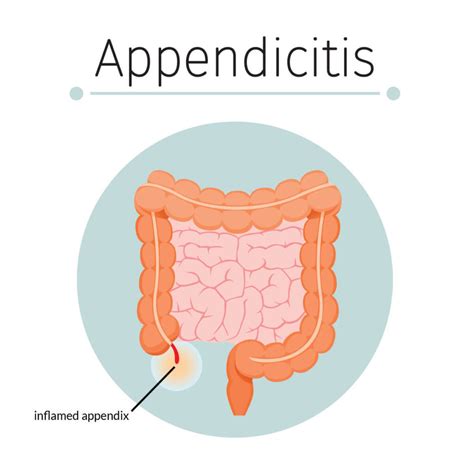
Appendicitis is an inflammation of the appendix, which is a small, finger-like pouch connected to the large intestine. The appendix is located near the junction of the small and large intestines and is thought to be a vestigial organ, meaning it has lost its original function through evolution. Despite its unclear function, the appendix can become inflamed, leading to appendicitis. This condition is usually caused by a blockage in the appendix, which can be due to a variety of factors, including fecaliths (hardened feces), foreign bodies, or lymphoid hyperplasia (an increase in the number of lymphoid cells).
Causes of Appendicitis
The exact cause of appendicitis is not always clear, but several factors can increase the risk of developing the condition. These include: - Age: Appendicitis most commonly occurs in people between the ages of 10 and 30. - Sex: Males are more likely to develop appendicitis than females. - Diet: A low-fiber diet may increase the risk of appendicitis. - Family history: Individuals with a family history of appendicitis are more likely to develop the condition. - Infection: Certain infections, such as gastrointestinal viral infections, can increase the risk of appendicitis.Symptoms of Appendicitis
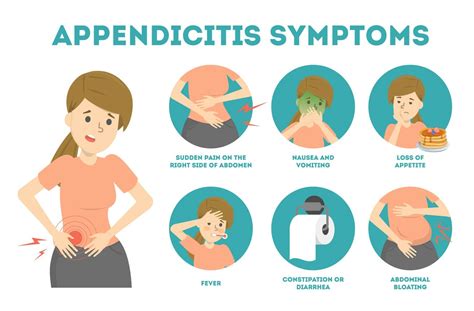
The symptoms of appendicitis can vary, but they often include:
- Abdominal pain: This is the most common symptom, typically starting near the belly button and then moving to the lower right side of the abdomen.
- Nausea and vomiting: These symptoms often occur after the abdominal pain begins.
- Fever: A low-grade fever may develop as the condition progresses.
- Loss of appetite: Individuals with appendicitis may experience a decrease in appetite.
- Abdominal tenderness: The abdomen may be tender to the touch, especially in the lower right region.
Diagnosing Appendicitis
Diagnosing appendicitis involves a combination of physical examination, medical history, and diagnostic tests. The physical examination may include checking for tenderness in the abdomen, and the medical history will focus on the symptoms experienced by the patient. Diagnostic tests may include: - Blood tests: To check for signs of infection or inflammation. - Urine tests: To rule out urinary tract infections or kidney stones. - Imaging tests: Such as X-rays, ultrasound, or CT scans to visualize the appendix and surrounding tissues.Treatment Options for Appendicitis
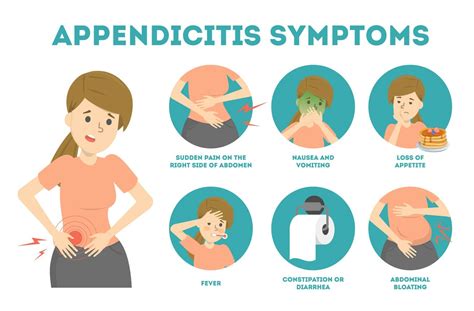
The primary treatment for appendicitis is the surgical removal of the appendix, known as an appendectomy. This surgery can be performed through an open approach, where a single large incision is made, or a minimally invasive approach, known as laparoscopic surgery, where several small incisions are made and a camera and surgical instruments are inserted through these incisions. The choice between these two approaches depends on the individual's condition, the severity of the appendicitis, and the surgeon's preference.
Post-Surgery Care
After surgery, patients typically stay in the hospital for a few days to recover. The recovery process involves: - Pain management: To control pain and discomfort. - Antibiotics: To prevent or treat any infection. - Dietary changes: Patients may initially be restricted to a liquid diet, gradually progressing to solid foods. - Activity level: Patients are advised to avoid heavy lifting, bending, or strenuous activities for a few weeks after surgery.Complications of Untreated Appendicitis
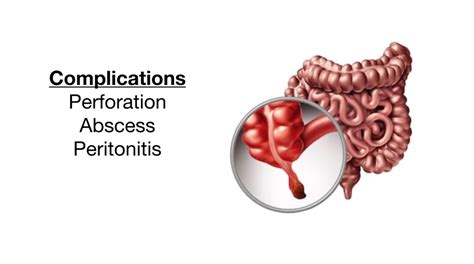
If appendicitis is left untreated, it can lead to serious complications, including:
- Rupture of the appendix: This can lead to peritonitis, an infection of the lining of the abdominal cavity, which is a life-threatening condition.
- Abscess formation: An abscess, a pocket of pus, can form around the ruptured appendix, which may require drainage.
- Peritonitis: Inflammation of the peritoneum, the lining of the abdominal cavity, which can be caused by a ruptured appendix.
Preventing Appendicitis
While the exact cause of appendicitis is not fully understood, and it may not be possible to completely prevent it, maintaining a healthy lifestyle, including a high-fiber diet, staying hydrated, and managing stress, may help reduce the risk of developing appendicitis.Living with Appendicitis
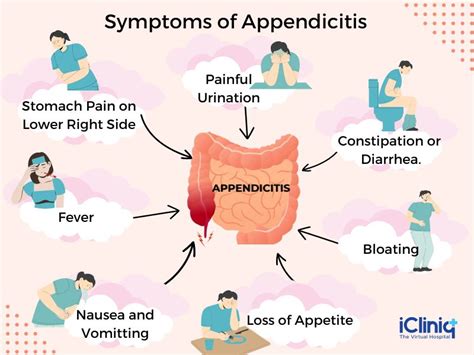
For individuals who have undergone an appendectomy, it's essential to follow the post-surgery care instructions provided by their healthcare provider to ensure a smooth recovery. This includes managing pain, following dietary advice, and gradually returning to normal activities. It's also crucial to recognize the signs of potential complications, such as infection or abscess formation, and seek medical help immediately if these occur.
Long-Term Outlook
The long-term outlook for individuals who have had their appendix removed is generally excellent. Most people can return to their normal activities within a few weeks of surgery. However, it's essential to maintain a healthy lifestyle and be aware of the potential for future health issues, such as adhesions or bowel obstruction, which can occur in some cases after abdominal surgery.Frequently Asked Questions
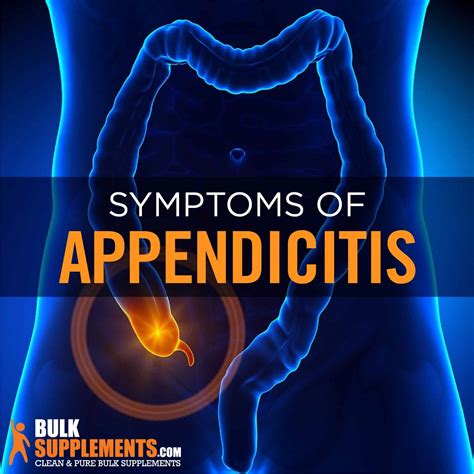
Can appendicitis be treated without surgery?
+In some cases, appendicitis might be treated with antibiotics alone, especially if the diagnosis is made early and the appendix has not ruptured. However, this approach is less common and requires close monitoring.
How long does it take to recover from an appendectomy?
+The recovery time from an appendectomy can vary, but most people can return to their normal activities within a few weeks after surgery. The exact recovery time depends on the individual's overall health, the severity of the appendicitis, and the type of surgery performed.
Can appendicitis recur after an appendectomy?
+Once the appendix is removed, appendicitis cannot recur in the same appendix. However, it's theoretically possible for the stump of the appendix to become inflamed, although this is extremely rare.
In conclusion, appendicitis is a serious medical condition that requires prompt attention and treatment. Understanding its symptoms, causes, and treatment options is crucial for individuals who may be at risk or have been diagnosed with the condition. By recognizing the importance of early diagnosis and treatment, individuals can ensure the best possible outcomes and prevent potential complications. If you or someone you know is experiencing symptoms of appendicitis, it's vital to seek medical help immediately. Share this article with others to raise awareness about appendicitis and encourage them to take proactive steps in maintaining their health.
